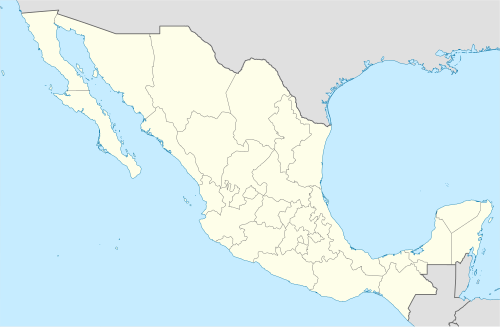2026 FIFA World Cup
| FIFA World Cup United 2026 Copa Mundial de la FIFA Unidos 2026 Coupe du monde de la FIFA Unis 2026 | |
|---|---|
 Bid logo | |
| Tournament details | |
| Host countries | Canada Mexico United States |
| Teams | 48 (from 6 confederations) |
| Venue(s) | 16 (in 16 host cities) |
← 2022 2030 → | |
The 2026 FIFA World Cup (Template:Lang-es; Template:Lang-fr) will be the 23rd FIFA World Cup, the quadrennial international men's soccer championship contested by the national teams of the member associations of FIFA. The tournament will be jointly hosted by 16 cities in three North American countries; 60 matches, including the quarterfinals, semi-finals, and the final, will be hosted by the United States while neighboring Canada and Mexico will each host 10 matches. The tournament will be the first hosted by three nations.[1][2] This tournament will be the first to include 48 teams, expanded from 32.[3]
The United 2026 bid beat a rival bid by Morocco during a final vote at the 68th FIFA Congress in Moscow. It will be the first World Cup since 2002 that will be hosted by more than one nation, and the first by more than two. With its past hosting of the 1970 and 1986 tournaments, Mexico will become the first country to host or co-host the men's World Cups three times. The United States last hosted the World Cup in 1994, whereas it will be Canada's first time hosting or co-hosting the men's tournament.
Format
Michel Platini, who was President of UEFA at the time, had suggested in October 2013 an expansion of the tournament to 40 teams,[4][5] an idea that FIFA president Gianni Infantino also suggested in March 2016.[6] A desire to increase the number of participants in the tournament from the previous 32 team format was announced on October 4, 2016. Four expansion options were considered:[7][8][9][10]
- Expand to 40 teams (8 groups of 5 teams) – 88 matches
- Expand to 40 teams (10 groups of 4 teams) – 76 matches
- Expand to 48 teams (opening 32-team playoff round) – 80 matches
- Expand to 48 teams (16 groups of 3 teams) – 80 matches
On January 10, 2017, the FIFA Council voted unanimously to expand to a 48-team tournament.[3]
The tournament will open with a group stage consisting of 16 groups of three teams, with the top two teams progressing from each group to a knockout tournament starting with a round of 32 teams.[11]
The number of games played overall will increase from 64 to 80, but the number of games played by finalists remains at seven, the same as with 32 teams. Each team will play one fewer group match than under the previous format, compensating for the additional knockout round. The tournament will also be completed within 32 days, the same as previous 32-team tournaments.[12]
Criticism
The use of a three-team group stage with two teams progressing has been criticized for increasing the risk of collusion between teams (as seen in previous World Cup group matches such as the 1982 "Disgrace of Gijón").[13] FIFA's chief technical officer Marco van Basten has suggested that draws may be prevented during the group stage by the use of penalty shootouts.[14] This would mitigate the increased risk of collusion, but not by much, and would introduce the possibility of a team deciding to eliminate a rival by deliberately losing a penalty shootout.[13]
Host selection

The FIFA Council went back and forth between 2013 and 2017 on limitations within hosting rotation based on the continental confederations. Originally, it was set that bids to be host would not be allowed from countries belonging to confederations that hosted the two preceding tournaments. It was temporarily changed to only prohibit countries belonging to the confederation that hosted the previous World Cup from bidding to host the following tournament,[15] before the rule was changed back to its prior state of two World Cups. However, the FIFA Council did make an exception to potentially grant eligibility to member associations of the confederation of the second-to-last host of the FIFA World Cup in the event that none of the received bids fulfill the strict technical and financial requirements.[16][17] In March 2017, FIFA president Gianni Infantino confirmed that "Europe (UEFA) and Asia (AFC) are excluded from the bidding following the selection of Russia and Qatar in 2018 and 2022 respectively."[18] Therefore, the 2026 World Cup could be hosted by one of the remaining four confederations: CONCACAF (North America; last hosted in 1994), CAF (Africa; last hosted in 2010), CONMEBOL (South America; last hosted in 2014), or OFC (Oceania, never hosted before), or potentially by UEFA in case no bid from those four met the requirements.

Co-hosting the FIFA World Cup—which had been banned by FIFA after the 2002 World Cup—was approved for the 2026 World Cup, though not limited to a specific number but instead evaluated on a case-by-case basis. Also for 2026, the FIFA general secretariat, after consultation with the Competitions Committee, had the power to exclude bidders who did not meet the minimum technical requirements to host the competition.[16]
Canada, Mexico and the United States had all publicly considered bidding for the tournament separately, but the United joint bid was announced on April 10, 2017.

| Allowed to vote | Banned from voting |
|---|---|
Voted for United bid | Canada–Mexico–United States |
Voted for Moroccan bid | Morocco |
Voted for neither | Sanctioned by FIFA |
Abstained from voting | Not a FIFA member |
Voting
The voting took place on June 13, 2018, during FIFA's annual congress in Moscow, and it was reopened to all eligible members.[19] The United bid won receiving 134 valid ballots, while the Morocco bid received 65 valid ballots. Upon the selection, Canada becomes the fifth country to host both men's and women's World Cup—the latter was in 2015—Mexico becomes the first country to host three men's World Cups—previously in 1970 and 1986—and the United States becomes the first country to host both men's and women's World Cup twice each—having hosted the 1994 men's and the 1999 and 2003 women's World Cups.
| Nation | Vote | |
|---|---|---|
| Round 1 | ||
| 134 | ||
| 65 | ||
| None of the bids | 1 | |
| Abstentions | 3 | |
| Total votes | 200 | |
Qualification
The 2026 World Cup's qualification process has yet to be decided. The FIFA Council is expected to decide which hosts, if any, will receive automatic qualifications to the tournament.[20][21][22] The United Bid personnel anticipated that all three host countries would be awarded automatic places.[23]
Slot allocation
On March 30, 2017, the Bureau of the FIFA Council (composed of the FIFA president and the presidents of each of the six confederations) proposed a slot allocation for the 2026 FIFA World Cup. The recommendation was submitted for the ratification by the FIFA Council.[20][24]
On May 9, 2017, two days before the 67th FIFA Congress, the FIFA Council approved the slot allocation in a meeting in Manama, Bahrain. It includes an intercontinental playoff tournament involving six teams to decide the last two FIFA World Cup berths.[21]
| Confederation | FIFA eligible members | Places in finals (including hosts) |
Percentage of members with places in finals |
Places before 2026 (excluding hosts, including half-places) |
|---|---|---|---|---|
| AFC | 46 | 8 | 17% | 4.5 |
| CAF | 54 | 9 | 17% | 5 |
| CONCACAF | 35 | 6 | 17% | 3.5 |
| CONMEBOL | 10 | 6 | 60% | 4.5 |
| OFC | 11 | 1 | 9% | 0.5 |
| UEFA | 55 | 16 | 29% | 13 |
| Playoff | – | 2 | 33% | – |
| Total | 211 | 48 | 23% | 31 (+ hosts) |
The issue of how to allocate automatic host country qualification given that there are multiple host countries has not yet been resolved and will be decided by the FIFA council.[20][21][22] The United bid anticipated that all three host countries would be awarded automatic places.[23]
The ratification of slot allocation gives OFC a guaranteed berth in the final tournament for the first time in FIFA World Cup history. The 2026 FIFA World Cup will be the first tournament in which all six confederations have guaranteed berths.
Playoff tournament
A playoff tournament involving six teams will be held to decide the last two FIFA World Cup berths,[20] consisting of one team per confederation (except for UEFA) and one additional team from the confederation of the host countries (i.e. CONCACAF).
Two of the teams will be seeded based on the FIFA World Rankings, and the seeded teams will play for a FIFA World Cup berth against the winners of the first two knockout games involving the four unseeded teams.
The tournament is to be played in one or more of the host countries and to be used as a test event for the FIFA World Cup. The existing playoff window of November 2025 has been suggested as a tentative date for the 2026 edition.
Candidate cities and venues
During the bidding process, 41 cities with 43 existing, fully functional venues and 2 venues under construction submitted to be part of the bid (3 venues in 3 cities in Mexico, 9 venues in 7 cities in Canada and 38 venues in 34 cities in the United States). A first round elimination cut 9 venues and 9 cities, then a second round elimination cut an additional 9 venues in 6 cities while 3 venues in 3 cities dropped out due to FIFA's unwillingness to discuss financial details,[citation needed] reducing the total number to 23 venues, each in their own city or metropolitan area. The Canadian candidate stadiums have different sporting uses (Edmonton's is the home of a Canadian Football League (CFL) team, Toronto's is a dual-use Major League Soccer (MLS) and CFL stadium and Montreal's does not have a permanent tenant), all of the Mexican candidate stadiums have tenants who are in Liga MX, and all of the American candidate stadiums have tenants who are in the National Football League (NFL) with the exception of Orlando's and Los Angeles's, whose primary usages are for National Collegiate Athletic Association (NCAA) collegiate American football.
Although there are dedicated MLS association football venues in Canada and the United States, the largest dedicated MLS stadium seats 30,000, which falls short of FIFA's minimum of 40,000 (Toronto's candidate venue, which is an MLS stadium is being expanded from 30,000 to 45,500 for this tournament). However there are some stadiums, like Mercedes-Benz Stadium in Atlanta and Lumen Field in Seattle that are used by both NFL and MLS teams. Although primarily used for gridiron football, all of the Canadian and American stadiums have been used on numerous occasions for association football matches and are also designed to host association football events.
The intention is to stage matches at 16 venues (3 in Canada, 3 in Mexico, and 10 in the United States). While Canada and Mexico have narrowed to their respective 3, 17 options in the United States remain in play pending final selection, leaving 23 candidate cities and venues:
- A † denotes a stadium used for previous men's World Cup tournaments (United States and Mexico only).
- A ‡ denotes an indoor stadium with a fixed or retractable roof.
Canada
| Edmonton[25] | Toronto[25] | |
|---|---|---|
| Commonwealth Stadium | BMO Field | |
| Capacity: 55,819 (Bid book capacity: 56,418) |
Capacity: 30,000 (Expanding to 45,500 for tournament) | |

|

| |
|
Canadian candidate cities | ||
Mexico
| Mexico City[25] | Monterrey[25] | Guadalajara[25] |
|---|---|---|
| Estadio Azteca† | Estadio BBVA (Guadalupe, Nuevo León) |
Estadio Akron (Zapopan, Jalisco) |
| Capacity: 87,523 | Capacity: 53,500 (Bid book capacity: 53,460) |
Capacity: 49,850 (Bid book capacity: 48,071) |

|
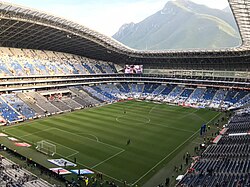
|

|
|
Mexican candidate cities | ||
United States
| Los Angeles[25] | New York/New Jersey[25] | Washington, D.C.[25] | Dallas[25] |
|---|---|---|---|
| Rose Bowl† (Pasadena, California) |
MetLife Stadium (East Rutherford, New Jersey) |
FedExField (Landover, Maryland) |
AT&T Stadium‡ (Arlington, Texas) |
| Capacity: 92,542 (Bid book capacity: 88,432) |
Capacity: 82,500 (Bid book capacity: 87,157) |
Capacity: 82,000 (Bid book capacity: 70,249) (expandable to 91,704) |
Capacity: 80,000 (Bid book capacity: 92,967) (expandable to 105,000) |

|

|

|

|
| Kansas City[25] | Denver[25] | Houston[25] | Baltimore[25] |
| Arrowhead Stadium | Empower Field at Mile High | NRG Stadium‡ | M&T Bank Stadium |
| Capacity: 76,416 (Bid book capacity: 76,640) |
Capacity: 76,125 (Bid book capacity: 77,595) |
Capacity: 72,220 | Capacity: 71,006 (Bid book capacity: 70,976) |
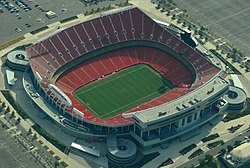
|
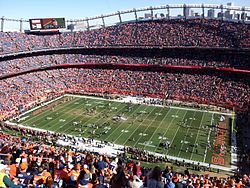
|
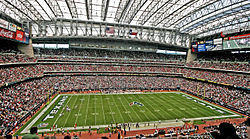
|
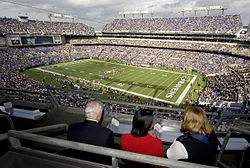
|
| Atlanta[25] | |||
| Mercedes-Benz Stadium‡ | |||
| Capacity: 71,000 (Bid book capacity: 75,000) (expandable to 83,000) | |||

| |||
| Philadelphia[25] | Nashville[25] | Seattle[25] | San Francisco Bay Area[25] |
| Lincoln Financial Field | Nissan Stadium | Lumen Field | Levi's Stadium (Santa Clara, California) |
| Capacity: 69,796 (Bid book capacity: 69,328) |
Capacity: 69,143 (Bid book capacity: 69,722) (expandable to 75,000) |
Capacity: 69,000 (expandable to 72,000) |
Capacity: 68,500 (Bid book capacity: 70,909) (expandable to 75,000) |
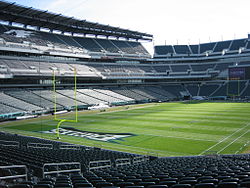
|
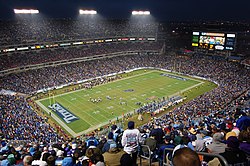
|

|

|
| Boston[25] | Cincinnati[25] | Miami[25] | Orlando[25] |
| Gillette Stadium (Foxborough, Massachusetts) |
Paul Brown Stadium | Hard Rock Stadium (Miami Gardens, Florida) |
Camping World Stadium† |
| Capacity: 65,878 (Bid book capacity: 70,000) |
Capacity: 65,515 (Bid book capacity: 67,402) |
Capacity: 64,767 (Bid book capacity: 67,518) |
Capacity: 60,219 (Bid book capacity: 65,000) |

|
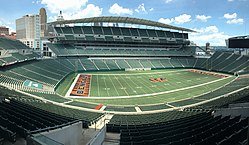
|
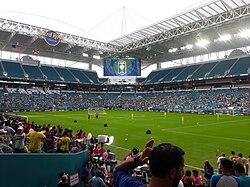
|

|
Criticism and controversies
The European Club Association and its member clubs opposed the proposal for expanding the World Cup, saying that the number of games was already at an "unacceptable" level and they urged the governing body to reconsider its idea of increasing the number of teams that qualify.[26] They contended that it was a decision taken for political reasons because Infantino would thus satisfy his electorate, rather than for sporting reasons.[27] Liga de Fútbol Profesional president Javier Tebas agreed, asserting the unacceptability of the new format. He told Marca that the football industry is maintained thanks to clubs and leagues, not FIFA, and that Infantino had used the promise of more countries playing in the World Cup to win his election.[28] German national team coach Joachim Löw warned that expansion, as had occurred for Euro 2016, would dilute the value of the world tournament because players have already reached their physical and mental limit.[29]
U.S. President Donald Trump's executive orders regarding immigration from certain Muslim-majority countries implemented in 2017 was touted as a potential risk, with Infantino saying, "Any team, including the supporters and officials of that team, who qualify for a World Cup need to have access to the country, otherwise there is no World Cup."[30] In response, the Trump administration sent letters to FIFA that read, in part, that Trump was "confident" that "all eligible athletes, officials and fans from all countries around the world would be able to enter the United States without discrimination."[31] In 2018, Trump then warned the countries that intended to support the Morocco bid to host the 2026 World Cup, tweeting: "The US has put together a STRONG bid w/ Canada & Mexico for the 2026 World Cup. It would be a shame if countries that we always support were to lobby against the U.S. bid. Why should we be supporting these countries when they don't support us (including at the United Nations)?"[32] In January 2021, the travel ban was reversed by his successor Joe Biden.[33]
Broadcasting rights
 Albania – RTSH[34]
Albania – RTSH[34] Armenia – ARMTV[35]
Armenia – ARMTV[35] Australia – SBS[36]
Australia – SBS[36] Canada – CTV, TSN, RDS[37]
Canada – CTV, TSN, RDS[37] Denmark - DR, TV2[38]
Denmark - DR, TV2[38] Finland - YLE, MTV[39]
Finland - YLE, MTV[39] Norway - NRK, TV2[40]
Norway - NRK, TV2[40] Sweden - SVT, TV4[39]
Sweden - SVT, TV4[39] United States – Fox, Telemundo[41]
United States – Fox, Telemundo[41]
On February 12, 2015, Fox, Telemundo, and Bell Media's rights to the tournament were renewed by FIFA to cover 2026, without accepting any other bids. The New York Times believed that this extension was intended as compensation for the rescheduling of the 2022 World Cup to November–December rather than its traditional June–July scheduling, which falls during the heart of the National Football League season (where Fox is currently a main U.S. rightsholder), and the beginning of the National Basketball Association and National Hockey League seasons.[42][43][44]
References
- ^ "World Cup 2026: Canada, US & Mexico joint bid wins right to host tournament". BBC Sport. June 13, 2018. Archived from the original on January 14, 2021. Retrieved June 13, 2018.
- ^ Carlise, Jeff (April 10, 2017). "U.S., neighbors launch 2026 World Cup bid". ESPN. Archived from the original on April 11, 2017.
- ^ a b "Unanimous decision expands FIFA World Cup to 48 teams from 2026". FIFA. January 10, 2017. Retrieved January 10, 2017.
- ^ "Michel Platini calls for 40-team World Cup starting with Russia 2018". The Guardian. October 28, 2013. Retrieved January 24, 2015.
- ^ "Michel Platini's World Cup expansion plan unlikely — Fifa". BBC Sport. October 29, 2013. Archived from the original on April 21, 2014. Retrieved January 24, 2015.
- ^ "Infantino suggests 40-team World Cup finals". Independent Online. South Africa: IOL. Reuters. March 30, 2016. Archived from the original on December 30, 2016.
- ^ "New Fifa chief backs 48-team World Cup". HeraldLIVE. October 7, 2016. Archived from the original on October 10, 2016.
It's an idea, just as the World Cup with 40 teams is already on the table with groups of four or five teams.
- ^ "Fifa's 5 options for a 2026 World Cup of 48, 40 or 32 teams". Yahoo! Sports. Associated Press. December 23, 2016. Archived from the original on January 10, 2017.
- ^ "FIFA World Cup format proposals" (PDF). FIFA. December 19, 2016. Archived from the original (PDF) on September 15, 2018. Retrieved January 10, 2017.
- ^ "Federations 'overwhelmingly in favour' of 48-team World Cup – Infantino". ESPN. December 28, 2016.
- ^ "Fifa approves Infantino's plan to expand World Cup to 48 teams from 2026". The Guardian. Archived from the original on January 10, 2017. Retrieved January 10, 2017.
- ^ "World Cup: Gianni Infantino defends tournament expansion to 48 teams". BBC Sport. January 10, 2017. Archived from the original on March 31, 2017.
- ^ a b Guyon, Julien (April 30, 2020). "Risk of Collusion: Will Groups of 3 Ruin the FIFA World Cup?". Journal of Sports Analytics: 1–21. doi:10.3233/JSA-200414.
- ^ "Penalty shootouts may be used to settle drawn World Cup matches". World Soccer. January 18, 2017.
- ^ "Current allocation of FIFA World Cup confederation slots maintained". FIFA. May 30, 2015. Archived from the original on May 30, 2015.
- ^ a b "FIFA Council discusses vision for the future of football". FIFA. October 14, 2016. Archived from the original on October 17, 2016.
- ^ "FIFA blocks Europe from hosting 2026 World Cup, lifting Canada's chances". Canadian Broadcasting Corporation. Associated Press. October 14, 2016. Archived from the original on October 14, 2016.
- ^ "Trump travel ban could prevent United States hosting World Cup". The Guardian. March 9, 2017.
- ^ Graham, Bryan Armen (June 13, 2018). "North America to host 2026 World Cup after winning vote over Morocco – as it happened" – via www.theguardian.com.
- ^ a b c d "Bureau of the Council recommends slot allocation for the 2026 FIFA World Cup". FIFA. March 30, 2017. Archived from the original on April 9, 2017.
- ^ a b c "FIFA Council prepares Congress, takes key decisions for the future of the FIFA World Cup". FIFA. May 9, 2017. Archived from the original on June 18, 2017.
- ^ a b "World Cup 2026: Canada, US & Mexico joint bid wins right to host tournament". BBC Sport. June 13, 2018. Retrieved June 13, 2018.
- ^ a b "United 2026 bid book" (PDF). Retrieved June 13, 2018.
- ^ "World Cup 2026: Fifa reveals allocation for 48-team tournament". BBC. March 30, 2017. Archived from the original on March 30, 2017.
- ^ a b c d e f g h i j k l m n o p q r s t u v Cite error: The named reference
bid_citieswas invoked but never defined (see the help page). - ^ "World Cup: Europe's top clubs oppose FIFA's expansion plans". CNN. December 15, 2016. Archived from the original on December 24, 2016.
- ^ "Críticas a decisión de la FIFA de jugar el Mundial 2026 con 48 selecciones". El Universo (in Spanish). Agence France-Presse. January 10, 2017. Archived from the original on January 11, 2017.
- ^ "Mundial de 48 equipos: durísimas críticas en Europa". Clarín (in Spanish). January 10, 2017. Archived from the original on January 12, 2017.
- ^ "Low confirms opposition to 40-team World Cup". sbs.com.au. Australian Associated Press. October 2, 2016. Archived from the original on October 5, 2016.
- ^ Hill, Tim (March 9, 2017). "Trump travel ban could prevent United States hosting World Cup". the Guardian. Retrieved June 2, 2018.
- ^ Das, Andrew (June 12, 2018). "How 3 Letters From Trump Might Help Bring the 2026 World Cup to the U.S." The New York Times. Retrieved September 28, 2020.
- ^ "Donald Trump issues warning to other countries over voting against US 2026 World Cup bid". The Independent. April 27, 2018.
- ^ Lanard, Noah (January 20, 2021). "Biden Just Ended Trump's Muslim Ban". Retrieved January 20, 2021.
- ^ "Albania venue to host 'maiden' UEFA showpiece". December 14, 2020. Retrieved January 30, 2021.
- ^ "ESPN: Serving sports fans. Anytime. Anywhere. - ESPN". ESPN.com. Retrieved January 30, 2021.
- ^ Hassett, Sebastian (October 28, 2011). "SBS locks in two more World Cups". Brisbane Times. Retrieved October 28, 2011.
- ^ Sandomir, Richard (February 12, 2015). "Fox and Telemundo to Show World Cup Through 2026 as FIFA Extends Contracts"". The New York Times.
- ^ Ross, Martin. "TV2 and DR continue major event rights drive with 2026 World Cup deal". Sportbusiness. Retrieved December 15, 2020.
- ^ a b "TV4 to show FIFA World Cup 2026 men's contest with SVT in Sweden, with YLE in Finland". Telecompaper. Retrieved December 21, 2020.
- ^ "TV2, NRK add to football rights pact with 2026 World Cup deal". SportBusiness. SportBusiness. Retrieved December 3, 2019.
- ^ Parker, Ryan (February 13, 2015). "2026 World Cup TV rights awarded without bids; ESPN 'surprised'". Los Angeles Times. Archived from the original on March 3, 2015.
- ^ "FIFA grants Fox, Telemundo U.S. TV rights for World Cup through 2026". SI.com. February 12, 2015.
- ^ "Why FIFA Made Deal With Fox for 2026 Cup". The New York Times. February 26, 2015.
- ^ "FIFA extending TV deals through 2026 World Cup with CTV, TSN and RDS". The Globe and Mail. February 12, 2015. Archived from the original on April 10, 2016.
External links
- FIFA World Cup 2026, FIFA.com
- 2026 FIFA World Cup
- Scheduled association football competitions
- FIFA World Cup tournaments
- 2026 in association football
- International association football competitions hosted by Canada
- International association football competitions hosted by Mexico
- International association football competitions hosted by the United States


